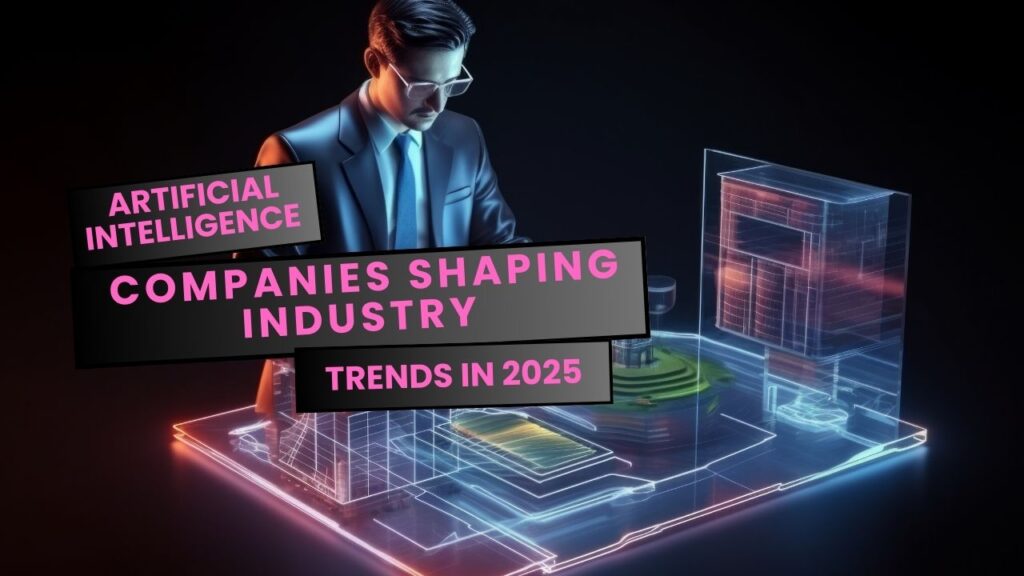
Artificial Intelligence Companies Shaping Industry Trends in 2025
Artificial Intelligence (AI) has shifted from being a futuristic concept to a core driver of business transformation. In 2025, artificial intelligence companies are not just offering tools—they’re reshaping entire industries. From healthcare breakthroughs to financial innovations and eco-conscious solutions, AI has become the backbone of progress.
In this article, we’ll explore how Artificial Intelligence Companies Shaping Industry Trends in 2025 are influencing enterprises, governments, startups, and consumers worldwide.
The Rise of AI in 2025
By 2025, AI adoption will reach unprecedented levels. According to PwC, AI could contribute up to $15.7 trillion to the global economy by 2030. That means businesses adopting AI today will be the market leaders of tomorrow.
Artificial intelligence companies are no longer just technology vendors—they are strategic partners that enable businesses to automate processes, unlock insights, and deliver personalized customer experiences.
Surprising Statistics About AI Trends in 2025
Here are some facts that will make you pause:
75% of enterprises are expected to move from AI pilot projects to full-scale deployments by 2025 (Gartner).
By 2025, AI-powered automation could save businesses $6.6 trillion annually (Accenture).
70% of organizations already report positive ROI from AI, yet only 21% have achieved scale (MIT Sloan).
AI in healthcare alone is projected to reach $188 billion by 2030 (Statista).
Retail companies using AI for personalization see up to a 20% revenue increase (McKinsey).
How Artificial Intelligence Companies Are Shaping Industries
Let’s dive into how AI leaders are revolutionizing different sectors in 2025.
a) Large Enterprises
Data-driven decision-making at global scale.
Supply chain optimization with predictive AI.
Workforce automation that boosts efficiency.
b) Small & Medium Businesses (SMBs)
Affordable AI SaaS solutions.
Chatbots for customer engagement.
AI-driven marketing campaigns for higher ROI.
c) Government & Public Sector
Smart cities powered by IoT + AI.
AI in public safety and predictive policing.
AI chatbots for citizen services.
d) Healthcare
AI diagnostics reducing human error by up to 40%.
Predictive analytics for preventive care.
AI-assisted surgeries and drug discovery.
e) Finance & Fintech
Fraud detection through machine learning.
Automated trading and risk management.
Personalized financial planning with AI assistants.
f) Manufacturing / Industry 4.0
AI-powered predictive maintenance saving millions.
Smart robotics increasing productivity.
AI-driven quality control.
g) Retail & E-commerce
Hyper-personalized product recommendations.
AI demand forecasting reducing overstock.
Automated customer service agents.
h) Eco-conscious Consumers
AI in renewable energy management.
Smart grids powered by AI algorithms.
AI-driven carbon footprint reduction tools.
i) Education / EdTech
AI tutors offering personalized learning.
Predictive analytics to improve student retention.
Virtual classrooms with real-time AI feedback.
j) Startups
Rapid MVP development with AI tools.
Access to affordable AI APIs.
Investor-ready AI roadmaps.
How to Transition to AI in 2025
Many businesses are eager but hesitant to start. Here’s how you can transition effectively:
Step 1: Identify Opportunities
Analyze where AI can create the biggest impact—customer service, supply chain, marketing, or finance.
Step 2: Partner With Trusted AI Companies
Choose reliable artificial intelligence companies like Infinitech AI
that offer scalable, ethical, and customized AI solutions.
Step 3: Start Small, Then Scale
Begin with a pilot project—like an AI chatbot—and measure success before scaling across departments.
Step 4: Train Your Workforce
Invest in AI training so your team is ready to work alongside intelligent systems.
Step 5: Monitor & Evolve
AI isn’t static. Continuous feedback loops ensure sustainable performance.
How Artificial Intelligence Companies Are Changing Society
It’s not just about profits. The influence of AI companies extends into society:
Healthcare Access: AI brings affordable diagnostics to underserved areas.
Sustainability: AI reduces energy waste and supports eco-friendly policies.
Education: AI democratizes learning, providing quality education to remote regions.
Public Services: Governments improve efficiency with AI-driven citizen engagement.
By partnering with the right artificial intelligence companies, businesses can balance profitability with purpose.
External Resources to Explore
To dive deeper into AI trends, check these authoritative sources:
PwC AI Predictions
McKinsey AI Report
MIT Sloan AI Survey
Accenture AI Impact Study
Gartner AI Forecast
Statista AI Healthcare Data
World Economic Forum – AI
Stanford AI Index
OECD AI Observatory
Harvard Business Review – AI
Key Takeaways
Artificial intelligence companies are shaping every industry by 2025.
Enterprises, SMBs, governments, and startups all benefit from AI innovation.
AI is not only a profit-driver but also a force for social good.
Transitioning to AI requires strategic planning, expert partners, and continuous evolution./

